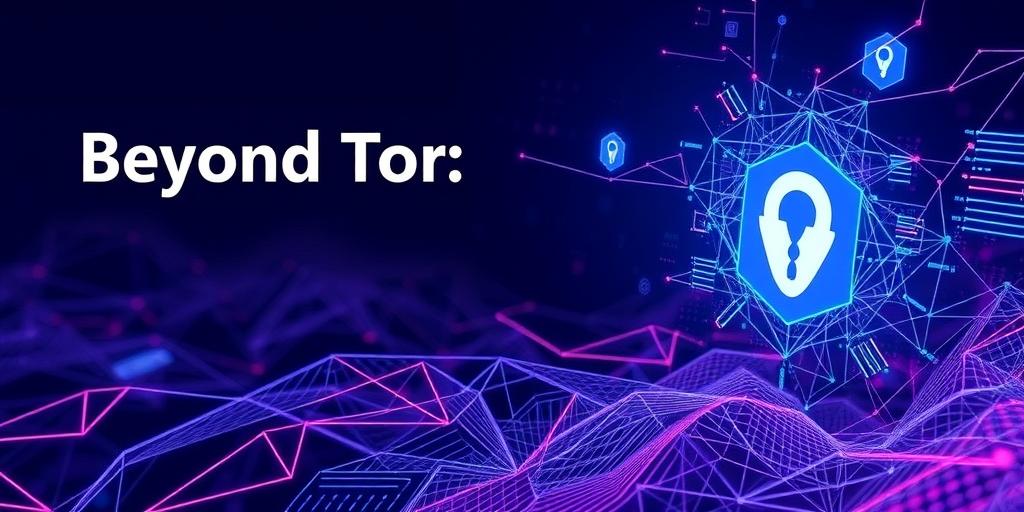In the realm of online privacy, Tor has long been a popular choice for users seeking anonymity. However, it's not the only game in town. While Tor offers a valuable layer of protection, alternatives like I2P (Invisible Internet Project) and Freenet provide unique approaches to achieving enhanced privacy. This post delves into I2P and Freenet, exploring their functionalities, strengths, and how they compare to Tor.
Understanding Tor's Limitations
Before diving into alternatives, it's important to acknowledge Tor's limitations. While effective, Tor is not impenetrable. It can be vulnerable to traffic analysis, node compromise, and exit node monitoring. Additionally, its speed can be a bottleneck due to its routing mechanism. These limitations have spurred the development of other privacy-focused networks.
I2P: A Deep Dive into the Invisible Internet Project
I2P is an anonymous, peer-to-peer distributed network layer that operates within the internet. Unlike Tor, which focuses on anonymizing web traffic, I2P is designed to host hidden services and applications. Here's a closer look:
- End-to-End Encryption: I2P encrypts all traffic end-to-end, adding a robust layer of security.
- Garlic Routing: This unique routing mechanism bundles multiple messages together, making it more difficult to trace individual requests.
- Hidden Services: I2P excels at hosting hidden services (called "eepsites"), providing a secure platform for anonymous communication and content sharing.
- Peer-to-Peer Network: The decentralized nature of I2P ensures no single point of failure, enhancing resilience.
I2P is particularly well-suited for users seeking to host services anonymously or engage in secure, private communication.
Freenet: Decentralized Data Storage and Sharing
Freenet takes a different approach, focusing on decentralized, censorship-resistant data storage and sharing. It operates as a peer-to-peer network where users contribute bandwidth and storage space. Key features include:
- Decentralized Storage: Data is distributed across the network, making it difficult to censor or remove.
- Content Encryption: All content stored on Freenet is encrypted, ensuring privacy.
- Censorship Resistance: Freenet is designed to be resistant to censorship, as there is no central authority to control content.
- Darknet Mode: Freenet can operate in "darknet mode," where connections are only made with trusted peers, further enhancing privacy.
Freenet is an excellent choice for individuals and groups seeking to share information freely and securely, without fear of censorship.
I2P vs. Freenet vs. Tor: Key Differences
While all three networks aim to enhance privacy, they differ in their approach and functionalities:
| Feature | Tor | I2P | Freenet | | :--------------- | :------------------------------------- | :---------------------------------------- | :---------------------------------------- | | Primary Use | Anonymizing web traffic | Hosting hidden services, private comms | Decentralized data storage and sharing | | Routing | Onion routing | Garlic routing | Peer-to-peer routing | | Encryption | Layered encryption | End-to-end encryption | Content encryption | | Decentralization | Partially decentralized | Fully decentralized | Fully decentralized | | Best For | General web browsing, accessing blocked sites | Hosting anonymous services, secure comms | Censorship-resistant data sharing |
Combining Privacy Tools
For maximum privacy, consider combining these tools. For example, you could use Tor to access I2P or Freenet, adding an extra layer of anonymity. However, be mindful of potential performance impacts, as routing traffic through multiple networks can significantly reduce speed.
Conclusion
While Tor remains a valuable tool for online privacy, I2P and Freenet offer unique and powerful alternatives. I2P excels at hosting hidden services and providing secure communication, while Freenet focuses on decentralized, censorship-resistant data storage and sharing. By understanding the strengths and limitations of each network, users can make informed decisions about which tools best suit their privacy needs. Remember that no single tool guarantees complete anonymity, and a comprehensive approach to online security is always recommended.









